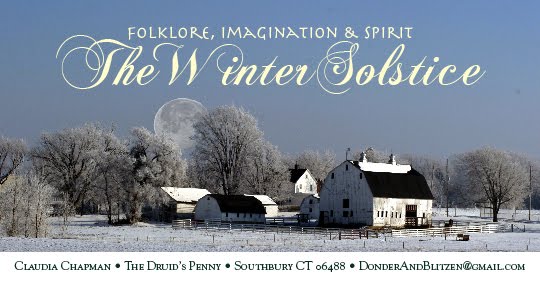I've given this some thought.
My own people had an oral tradition. The Druids were masters of memorization. Sitting two-by-two in beehive cairns they learned thousands of lines of history, law and poetry, without the aid of a written language. These cairns were made of rocks, and were the prehistoric equivalent of a study corral at the Druidic colleges. Almost all of this material fell victim to the advances of the Roman church.
I attended an ancient ritual on the pueblo with a tremendous sense of curiosity and reverence, but was surprised at how little I actually felt. Yet I fall in to tears when I sing a carol on Christmas Eve, even if I'm in the most austere church in town. Why?
The answer came quickly. It's because I grew up with these images. The story of Christmas was seared in to my memory before I was born, the groove well worn by the time I came in to my own personal age of consciousness. The words of the carols evoke memories from a time when my memories were not yet shaped by words. And so I cry simple tears of joy when I sing them.
Imagine the world, not all that long ago, before there was electricity, television, CD players, tape players, record players, transistor radios or "victrolas" as my grandfather called them. Where the advent vigil was kept in silence. The only music you heard when you were working alone, was the tune you sang yourself. Imagine what it would be like to come to Christmas Eve, not having heard the old familiar carols for a full year.
I realized that in a world where everything is recorded, that these are still an oral tradition. If we were brought up in a church community, we carry the entire story of Christmas in our head. On Christmas Eve, we come together and sing that story together. This speaks to something which is deeply rooted in our consciousness. It evokes pure feeling—the wonder and credulousness of childhood when our memories were formed without words. We must come together and sing to bring these memories and feelings to life. Our breath on the frosty air of Christmas Eve ignites a sleeping ember in our hearts, and we remember something from a time beyond our own brief span of years. Ember is the root of remember, just as advent is the root of adventure.
As a child, I hated going to choir practice on Tuesday afternoons. My mother would tell me "you can quit, but if you do you won't be able to sing on Christmas Eve...." This always won me over. I was brought up in Brooklyn, for goodness sake, but I still have an oral tradition which was passed down for centuries.

No comments:
Post a Comment